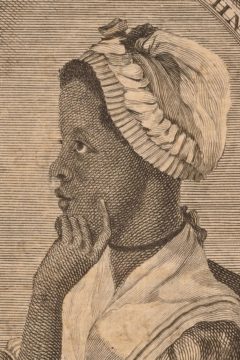Kerri Greenidge in The New York Times:
 It’s a testament to Black endurance and brilliance that the little girl called Phillis Wheatley became, within 12 years of her arrival in Boston, the most significant African American poet of the 18th century. Yet, as the historian David Waldstreicher shows in “The Odyssey of Phillis Wheatley,” his thoroughly researched, beautifully rendered and cogently argued biography, Wheatley is brilliant not merely because she survived and composed some of the most important works of trans-Atlantic literature. Rather, Waldstreicher insists, Wheatley was a supremely gifted neoclassical practitioner of language, an “organic intellectual of the enslaved.”
It’s a testament to Black endurance and brilliance that the little girl called Phillis Wheatley became, within 12 years of her arrival in Boston, the most significant African American poet of the 18th century. Yet, as the historian David Waldstreicher shows in “The Odyssey of Phillis Wheatley,” his thoroughly researched, beautifully rendered and cogently argued biography, Wheatley is brilliant not merely because she survived and composed some of the most important works of trans-Atlantic literature. Rather, Waldstreicher insists, Wheatley was a supremely gifted neoclassical practitioner of language, an “organic intellectual of the enslaved.”
…Waldstreicher asks us to appreciate the sarcasm in Wheatley’s lines. He suggests that she was well acquainted with a trans-Atlantic Methodism that deemed an “abominable hypocrisy” the widely accepted notion of the slave trade as a path for Africans to salvation. In her poem, Wheatley doesn’t reinforce the notion of African inferiority; she challenges it. This is apparent in the final two couplets: “Some view our sable race with scornful eye,/‘Their colour is a diabolic die.’/Remember, Christians, Negroes, black as Cain,/May be refin’d, and join th’ angelic train.” These couplets, Waldstreicher argues, are “the real point, set up by the first four lines that seem to bathe enslavement in evangelical glory, something white folks might want to believe.”
In portraying Wheatley as an often subversive artist who understands and talks back to the racial assumptions of her time, Waldstreicher refuses to take the white Wheatleys at their word.
More here.
